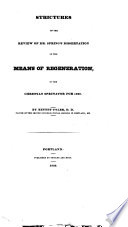 | Bennet Tyler - 1829 - 78 pages
...sinful, is influenced. All have the same ultimate end. This is indeed explicitly affirmed on p. 24. " Of all specific voluntary action, the happiness of the agent in some form is the ultimate end ; and since all the happiness known to man, is comprised in God or in the world, one or the other must... | |
 | 1829 - 742 pages
...be, the universal law of voluntary action while the selfish principle remains active in the heart. Of all specific voluntary action, the happiness of the agent in some form is the ultimate end ; and since all the happiness known to man is comprised in God, or in the world, one or the other must... | |
 | Bennet Tyler - 1830 - 68 pages
...the Reviewer means, when he says, that " self-love is the primary cause of moral action," and that " of all specific voluntary action, the happiness of the agent in some form is the ultimate end ;" as he seems occasionally to intimate, I have no dispute with him. Still I must think that he has... | |
 | 1833 - 996 pages
...multitude of passages from their discussions. It is by that which the Trustees quote from them : " of all specific voluntary action, the happiness of the agent, in some form, is the ultimate end." By the ultimate end is meant, as they explain themselves, the supreme aim, the prevalent affection... | |
 | Edward Dorr Griffin - 1833 - 230 pages
...without grace, then they must have the same tendency when man gives his heart to God through grace. "§ " Of all specific voluntary action, the happiness of the agent in some form is the ultimate end."\\ " We now ask what acts of the sinner must be denoted by the phrase using the means of regeneration... | |
 | Tyler Thacher - 1834 - 230 pages
...desperate efforts to fix his heart upon them." I presume that Dr. Taylor will admit this. For he says, " Of all specific voluntary action, the happiness of the agent, in some form is the ultimate end." Although this sentiment is not true in respecfto holy beings, yet'it must be admitted to be true in... | |
 | 1834 - 546 pages
...is the grand principle by which all moral beings, whether sinful or holy, are actuated. They say, " Of all specific, voluntary action, the happiness of the agent, in some form, is the ultimate end." Were we to adopt this principle, we should feel ourselves compelled to give up the doctrine of disinterested... | |
 | Leonard Woods, Charles D. Pigeon - 1839 - 622 pages
...primary cause of all acts of preference or choice is plainly taught in the two following passages. " Of all specific voluntary action, the happiness of the agent in some form is the ultimate end." This selflove or desire of happiness is the primary cause or reason of all acts of preference or choice,... | |
 | Bennet Tyler - 1837 - 216 pages
...relative value, so he chooses or prefers, one or the other as his chief good. "—Id. for 1829, p. 21. " Of all specific voluntary action, the happiness of the agent, in some form, is the ultimate end." Id. p. 24. " In this process, the sinner, from the desire of happiness, turns his thoughts to the decisions... | |
 | Leonard Woods, Charles D. Pigeon - 1838 - 692 pages
...attaches them to objects, is the same in all. "Self-love" they say, " is the primary cause of all moral action." " The happiness of the agent in some form, is the ultimate end of all specific voluntary action." Self-love then is the primary cause, and the happiness of the agent... | |
| |